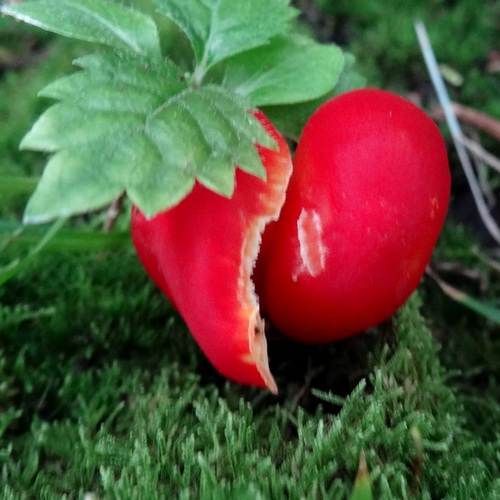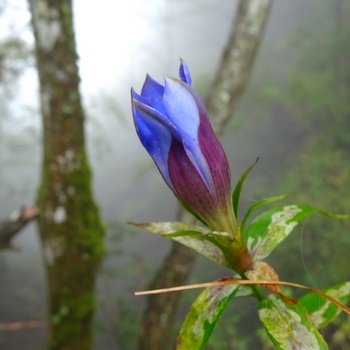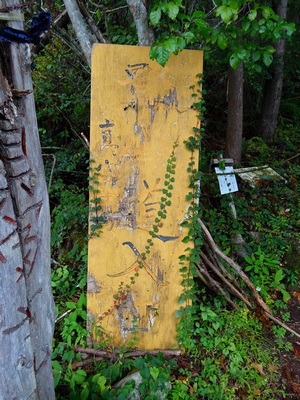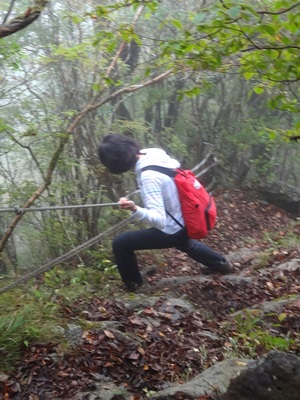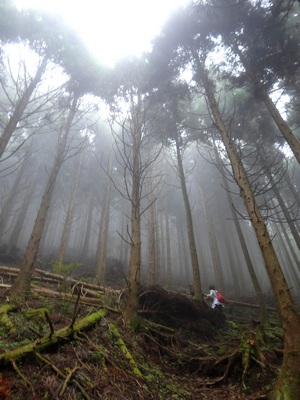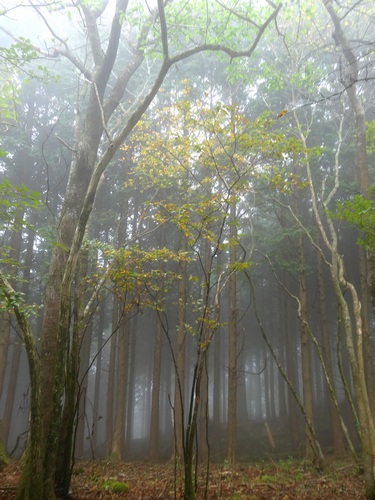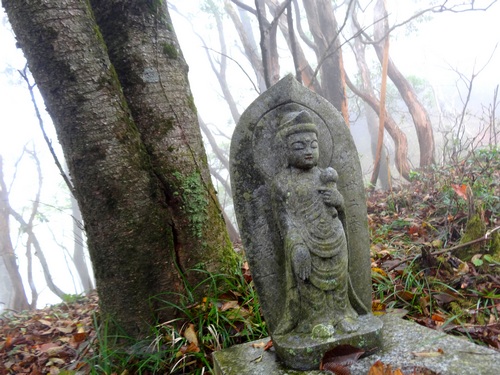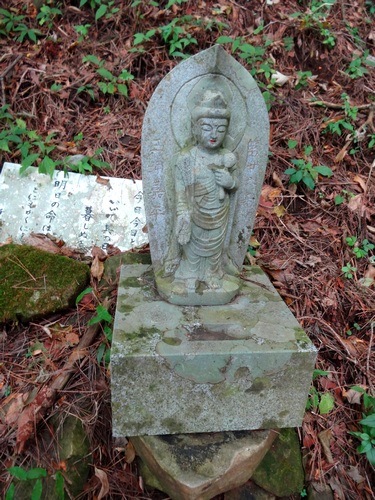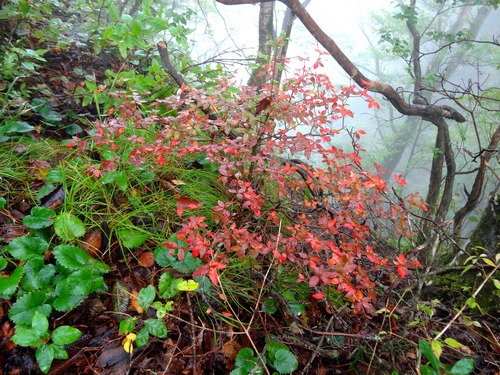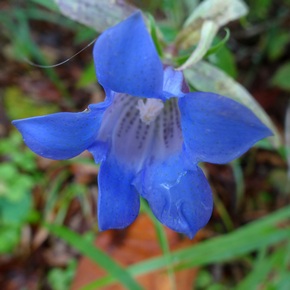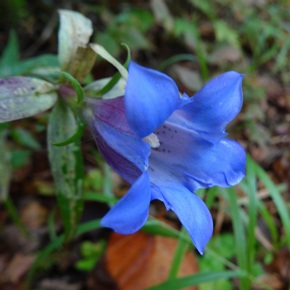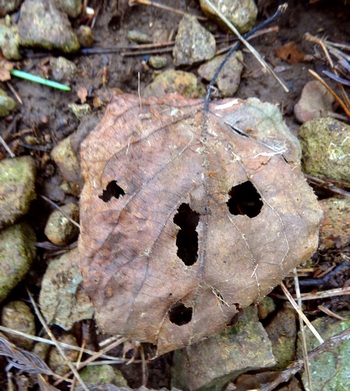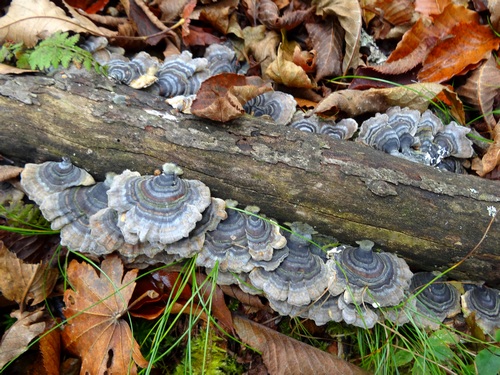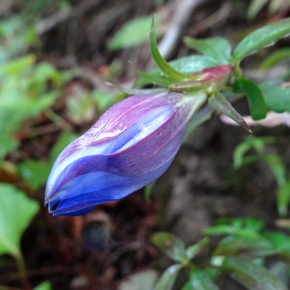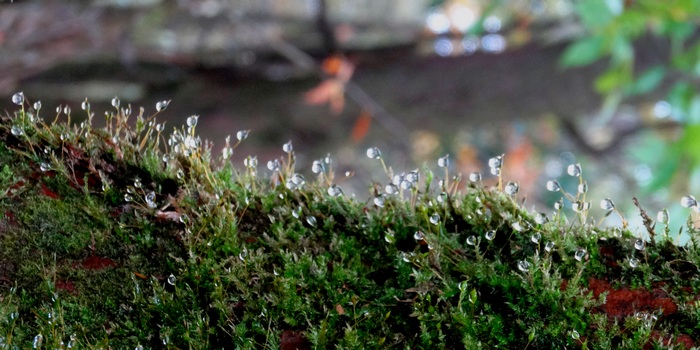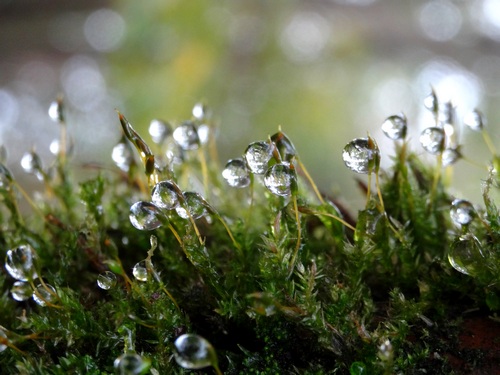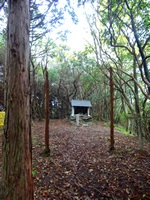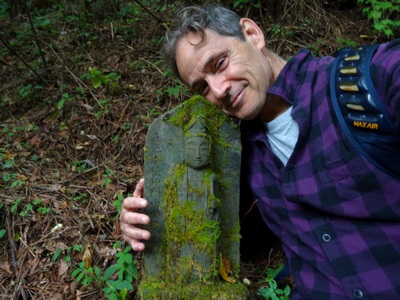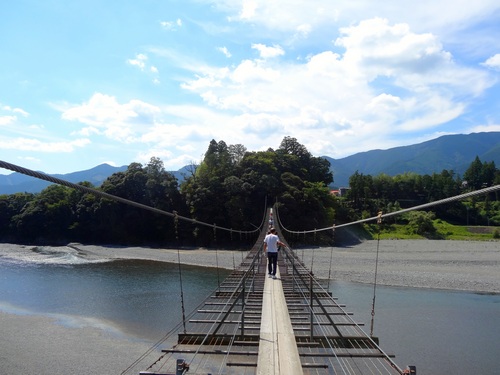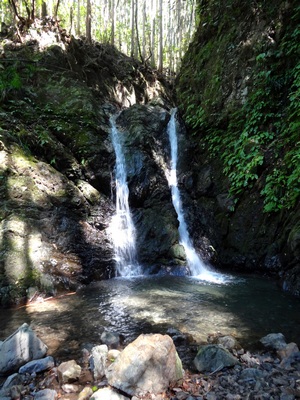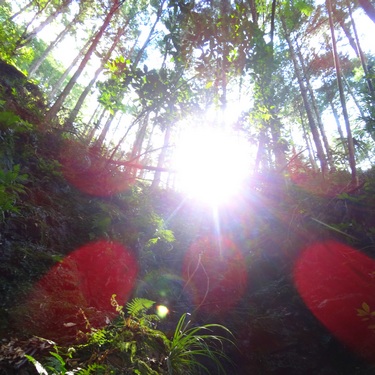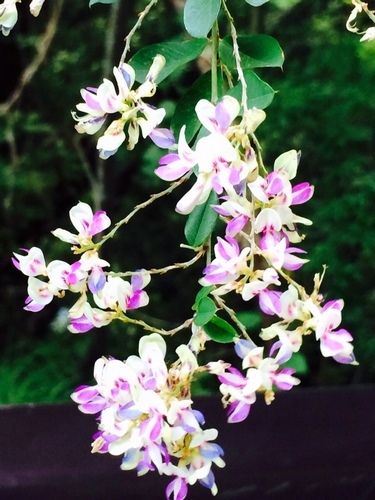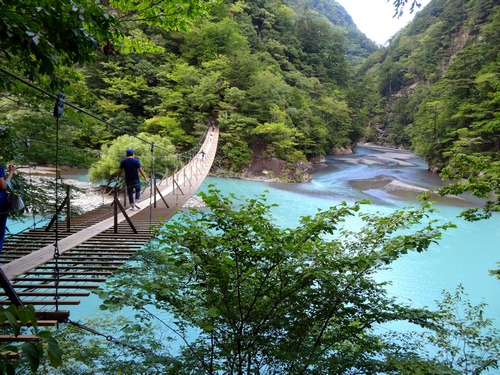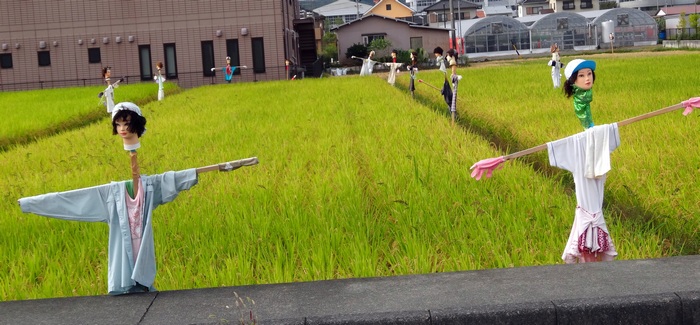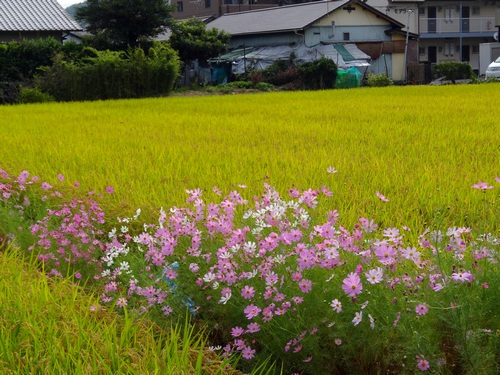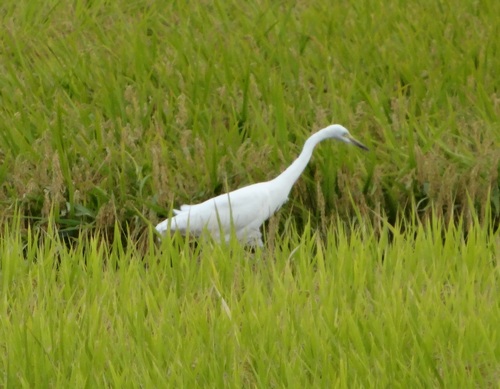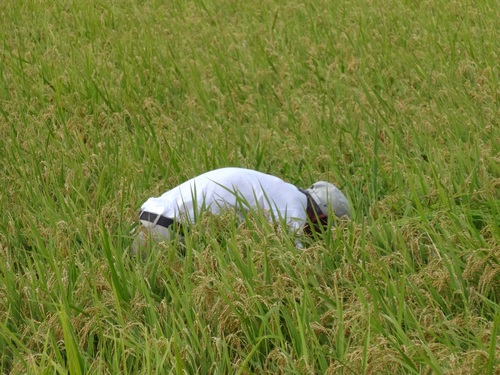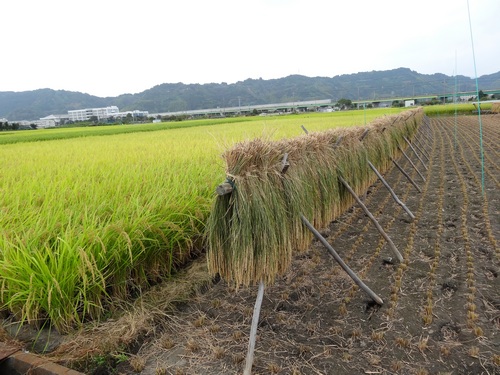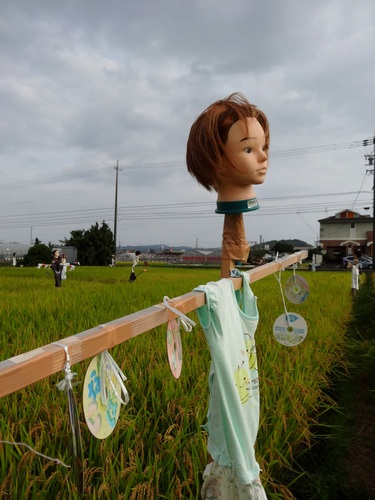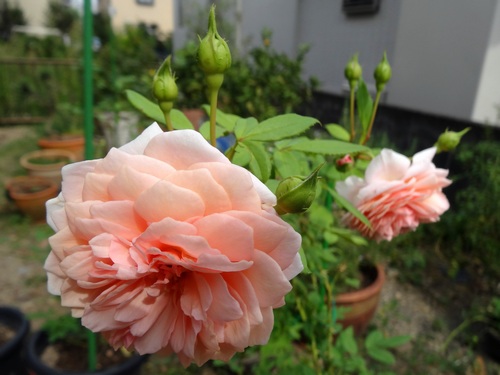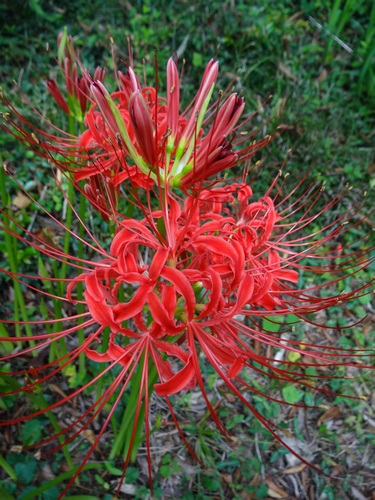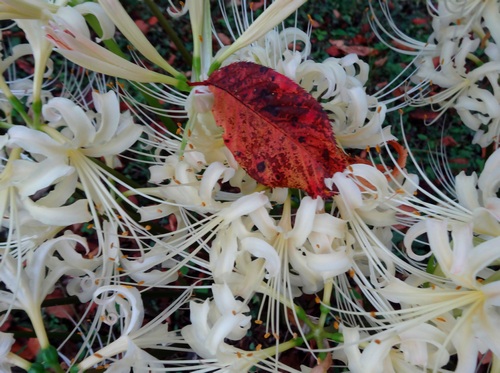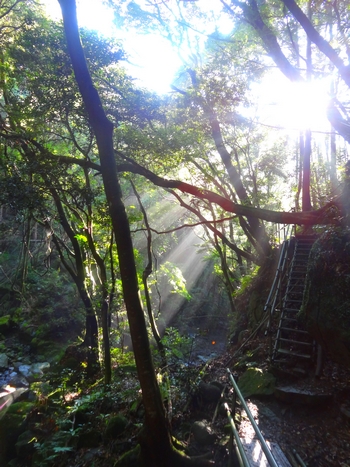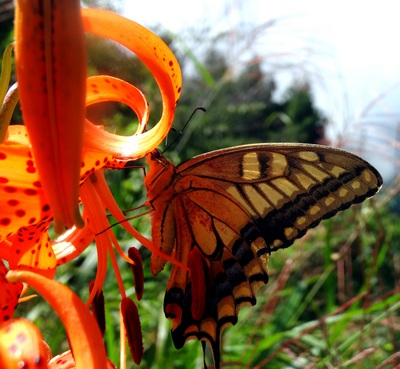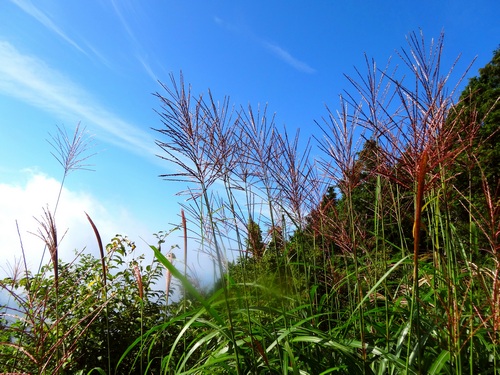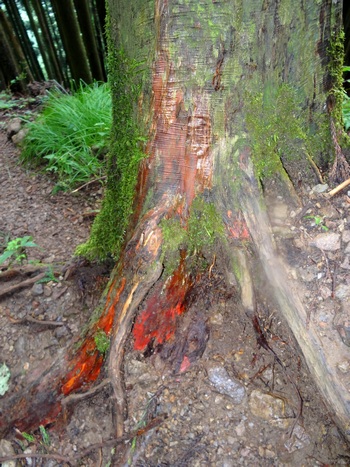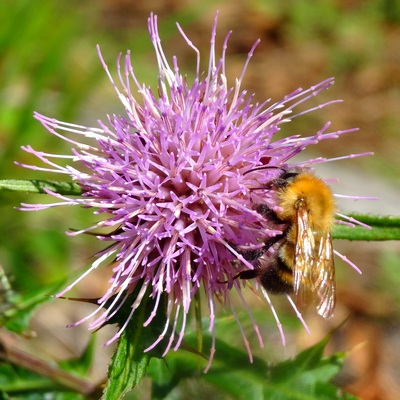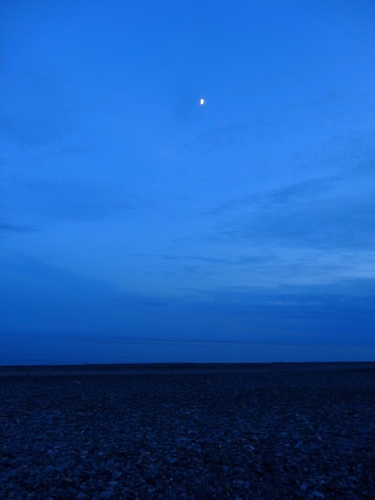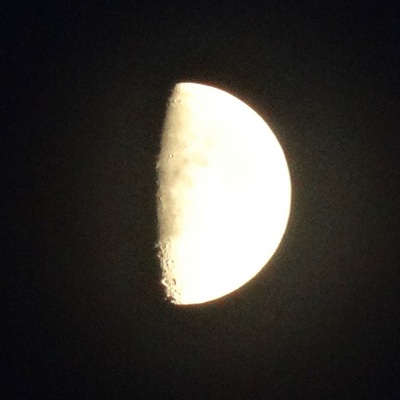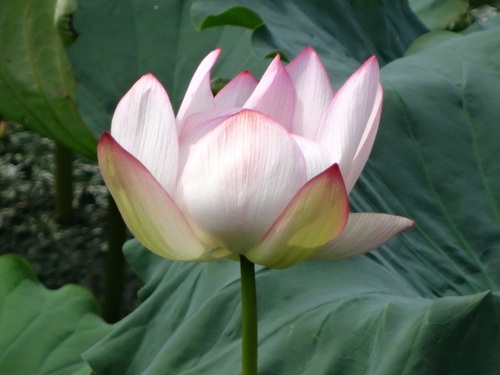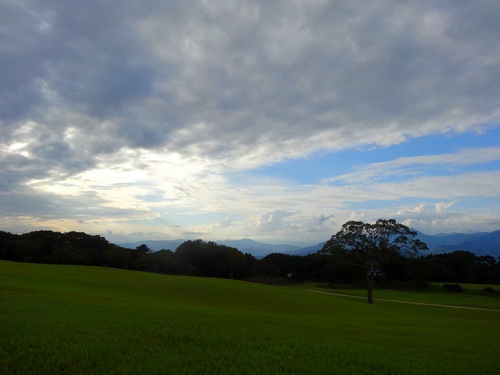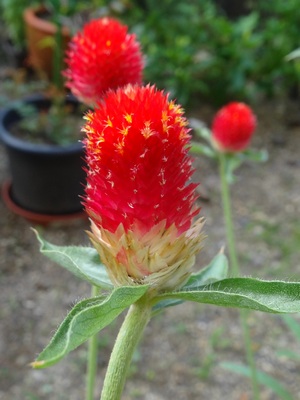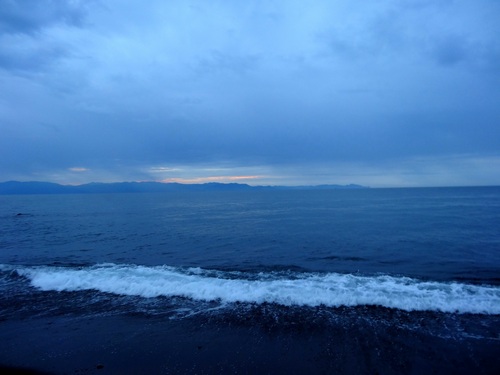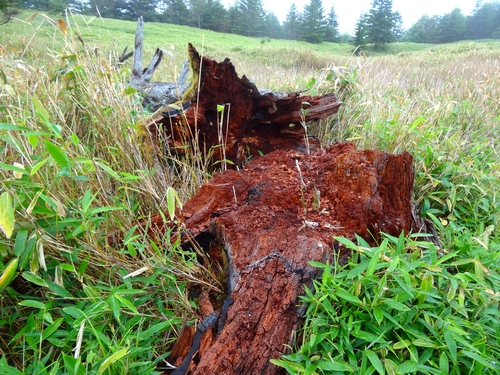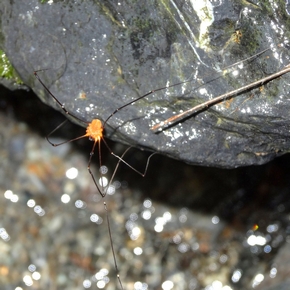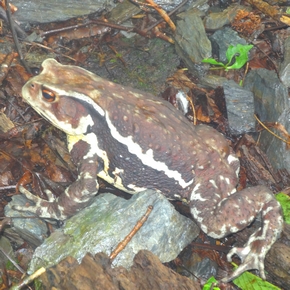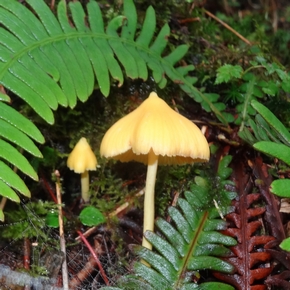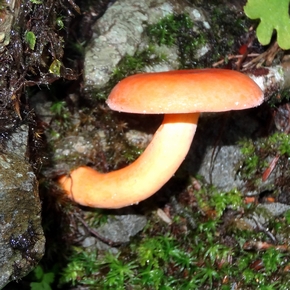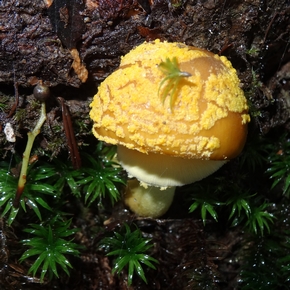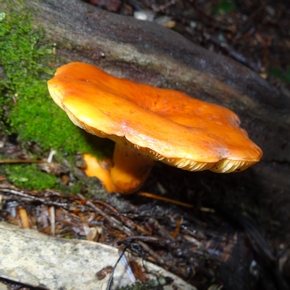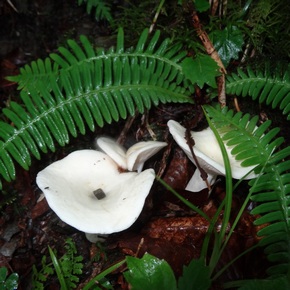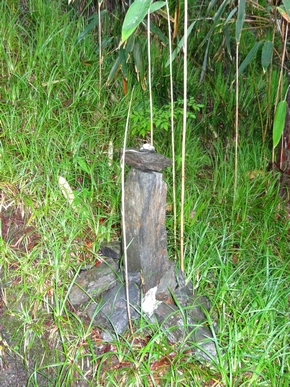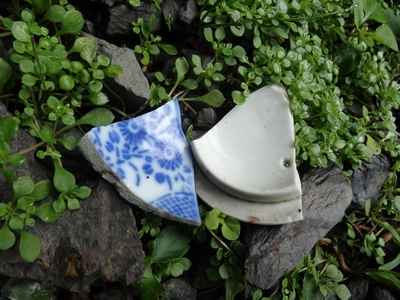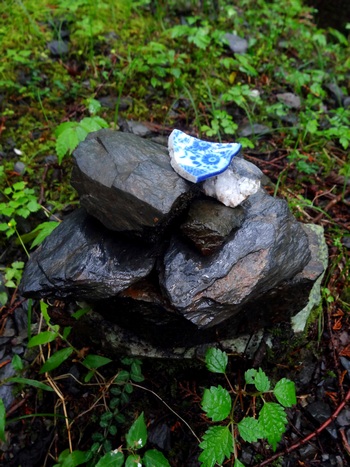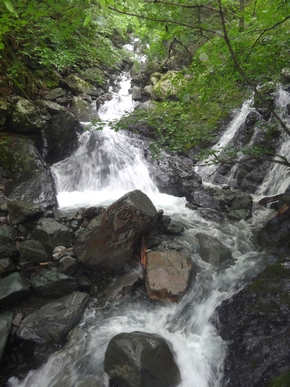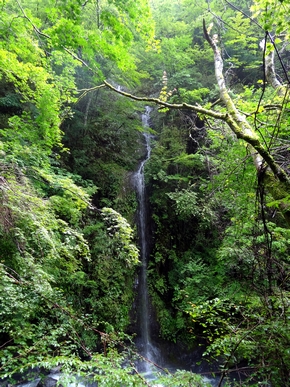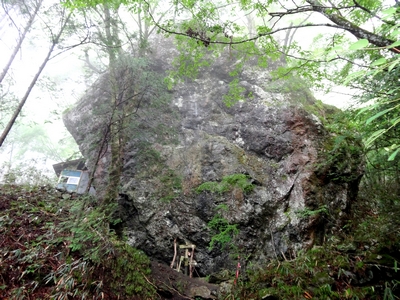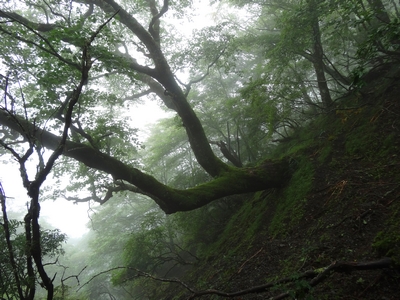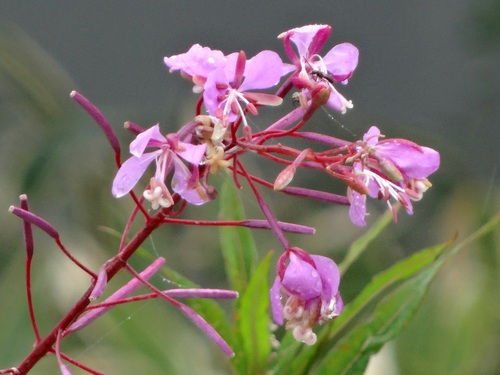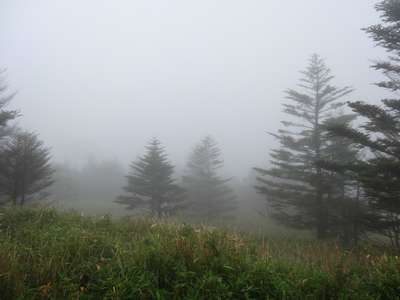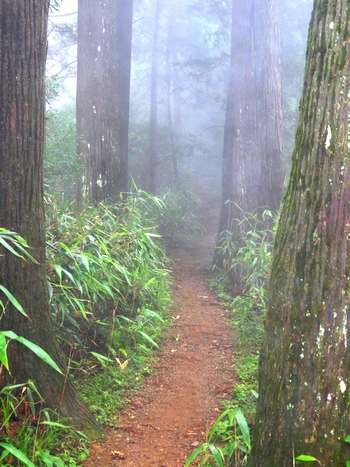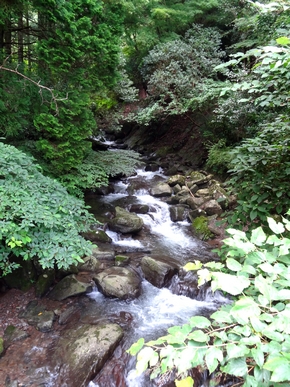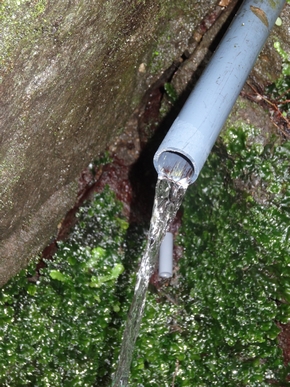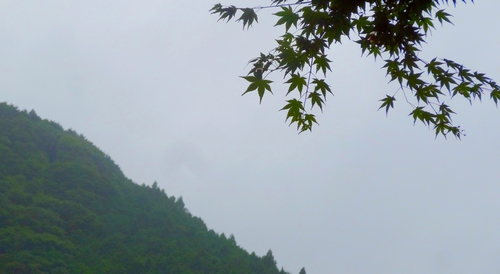What’s this? Halfway up Jumai Mountain, deep inside that neverending stretch of cedars, two scarlet red mushrooms huddled together, whispering of one broken heart?
All posts by Steve
Diamonds in the moss
Some days you don’t get blue skies.
And sometimes the trail markers are not very clear.
And sometimes things get a little steep.
And sometimes, when you’re chug-chug-chugging up through a long and neverending stretch of cedars, you get a feeling that you’re getting nowhere, that you’re looking up into the same trees you thought you had just passed, that your time to the top hasn’t diminished by a second.
But, usually, just then, that’s when the mist rolls in.
I like the mist.
The mist . . . in the forest . . . on the mountain.
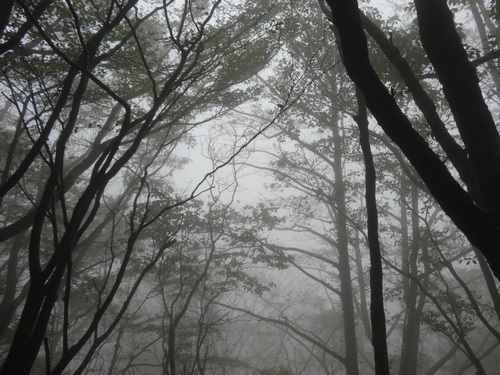 Kind of makes me feel like I’m closed inside a secret chamber, just the mountain and me and my hiking buddies inside.
Kind of makes me feel like I’m closed inside a secret chamber, just the mountain and me and my hiking buddies inside.
It’s peaceful.
When you’re on Mafuji Mountain, it’s a special sort of secret chamber, though, because all over the mountain you come across the Dieties of Mercy. The Goddesses of Kannon. If you’re in China, those may be the Goddesses of Kuan Yin.
These gals are great. They have heard all the sounds that the world has ever produced, and—I’m guessing—are aware of all the world has ever experienced. Just as you’d imagine, all that has turned them into exemplars of compassion. Their hearts are open to everyone. They turn no one away. They accept everyone. And they are all over Mafuji Mountain.
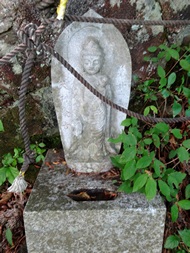
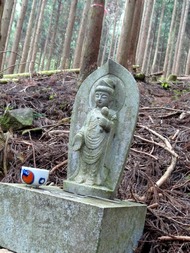
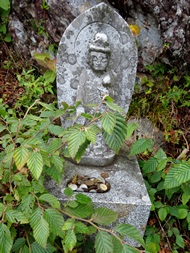 Some of these Kannon gals seemed pretty proud of their poetry. They had their poems displayed on big white boards as big as themselves.
Some of these Kannon gals seemed pretty proud of their poetry. They had their poems displayed on big white boards as big as themselves.
This poem roughly translates as . . .
Today, today.
Live for today.
Who knows what tomorrow will bring?
Some folks may say that the Kannon gals are especially eager to protect women and children, and you may be tempted to think that, too, when you see the way they’re always cuddling a baby to their breasts. But as I walked by each, I felt they were just as ready to be compassionate with me as with my two female companions. I asked one of my female companions what she thought. She said my vibe was right. So that’s what at least two people in this world think.
But don’t expect these Kannon gals to fill you in on all they’ve learned, or all they know, or all they are aware of. As enlightened as they are, they could not possibly do that. All they can tell you is to do what they have done.
“Look. Listen. Experience,” one said, as I walked by.
Well, in the mist, you do listen. There is the chirping of scattered birds—and there is the silence. You can hear the silence best when you don’t move.
And you look. The sun and blue sky are way off somewhere, but moisture abounds, and it can brighten colors, too. Dusty greens and reds, all wet, glisten.
Against glistening backgrounds, blues and purples intensify.
And then you realize you are looking. Looking at everything. You can’t stop looking. And you see things that, maybe, in a way, aren’t really there.
Like a jack-o-lantern inside a battered leaf.
Or clams and driftwood washed up on a leafy shore.
Or a slivering flower bud poised to strike.
Or diamonds.
Really, diamonds in the moss.
Just look.
Diamonds glistening in the misty light. Down on the ground. Inside the secret chamber. With you.
“I think I’m doing a lot more looking than listening,” I say.
“Whatever!” the Konnan gals reply, in chorus, giggling.
So what about the hike? you ask. How is all this going to help us plan our ascent? What kind of guide are you?
Okay, okay. Here are the details. We started. We took a wrong turn and had to turn back and find the right trail. (Imagine that! It was the trail that went up!)
A couple of hours later we were at the top. The ridge was about 10 degrees centigrade (maybe 22 degrees in Shizuoka City), but when we got to the peak (1403 meters) for lunch, it had turned oddly warm. Maybe that was because we offered up a total of 12 yen to the little god there (12 yen = 12 U.S. cents)—and the sun suddenly found a thin patch of cloud and mist to shine faintly through.
Actually, there are two peaks. They are named, as if for characters in a Dr. Seuss book, Peak One and Peak Two.
Somewhere near the lower peak (Peak One), there was a shrine, and we took several wrong turns looking for it, but finally we did find it. Its torii gate was broken—and it was not very big.
See, not very big at all. But it was very cute—I especially liked the gate—and there’s a nice view from there, too. So be sure to stop by.
From Shizuoka City, take route 29 to Hirano. At Hirano, turn right onto the rindoh (“the forest road”), just past the post office. Wind around for twenty minutes or so, across three bridges (I think it was three), past the “first” trailhead and the “second” trailhead. Park when you come to the “third” trailhead. That will be where you see the yellowish-orange sign that you can no longer read . A few years ago you could have read it just fine, and you would have been sure you’d indeed arrived at the “third” beginning point.
The sign that says there are bears in the vicinity is very legible. There are wild boars, too. Plenty of parking, at least for 9 or 10 cars, I’d guess.
Sometimes my right knee hurts coming down a mountain. It’s an old football injury. This time, though, it hurt only a wee bit—not nearly near enough to keep me from feeling immensely satisfied with the day.
Really, I did feel immensely satisfied. So immensely satisfied, in fact, that I had to give this guy a hug.
He’d been living on the mountain a long time, he said. He liked it there with all the Kannon gals.
Suspension Bridges
We decided to suspend our regular hiking plans—all of us were more than ready to rest our weary legs—and headed for Kawane Hot Springs.
We got there late morning, and after soaking our feet in the outdoor hot spring for footsies only—a freebie—we decided that that was enough for a while. So we suspended our Kawane Hot Springs plan, at least until late afternoon. We got back in the car and headed up Highway 63 . . . and then Highway 77. We didn’t have any plan.
“But where are we going?”
No one said that. How nice, how wonderfully nice, it was!
The first interesting thing we came to was a suspension bridge. It seemed every one driving by was stopping there. It may have been my imagination but they seemed to have come across it suddenly—just as we had—and been unable to pass it by.
“Hey, let’s walk across that suspension bridge.” It was like nobody could not say that.
The sign says that no more than ten people at a time are allowed on the bridge. Your first thought may be that that has something to do with physics. Such as the bridge can only sustain so much weight. Or a large number of footsteps at various points might lead to a swaying that would leave some folks a little queasy.
But I think not. Because I’ve heard that when you walk across a suspension bridge, you often find yourself suspending disbelief. All sorts of disbelief. And all of a sudden you find yourself imagining that you, if you decided to, could make something come true.
So that’s the reason. No one really knows what might happen if more than ten people, all at once, all in the same place, came to believe that they themselves could make something come true.
Not far from the suspension bridge, we discovered a trail that lead, the sign said, to a waterfall. Just a five-minute walk.
How can you not walk five minutes to a waterfall? Of course, we did. The waterfall was okay. We took some pictures. But we discovered something much better— a new way of looking at the sky.
Or maybe a new way of the looking at the sky reaching down for us.
And then we were off in the car again, heading farther away from Kawane Hot Springs. Nope, we never made it back.
But we must have passed five or six suspension bridges. And then we realized we were awful close to Sumata Ravine and we thought what the hell.
Of course, that would be the Sumata Ravine, the one famous for its suspension bridge. We walked from the resort to the ravine, chatting with some silly monkeys along the way . . .
. . . and taking some pictures . . .
. . . and then got in line. The sign said that if you walked out to the middle and made a “love” wish that it would come true. I took the sign at it’s word . . . though I did interpret L-O-V-E broadly.
Only ten people at a time. Only ten people at a time allowed to suspend their disbelief, to belief, for a moment at least, in love.
But our turn came. We walked out to the middle. And it was a good moment. We just stood there, swaying a bit, bouncing a bit, not sure exactly what was under us, but seeing, in so many grinning eyes, the suspension of disbelief.
Saturday rice, Monday typhoon
Saturday. The sentinels were out. Today, a steady rain. Monday, the typhoon’s coming.
The neighborhood. The beautiful rice. The beautiful cosmos.
A feathery fellow searching the rice.
A not so feathery fellow searching the rice.
Rice harvested. Rice harvested not.
Some folks harvest with machines. They skip the bundle-and-hang-upside-down step. An organic farmer I know tells me this isn’t wise. For a day or two, she says, more nutrients will flow from the stalk into the grains. More taste, she says passionately, will flow from the stalk into the grains.
And these guys and gals standing tall, watching over. Protecting. I’m hoping they’ll still be standing Monday.
How about these three guys? What are their chances?
I’m not sure what to say, but “Hang in there.” Or maybe, “Just do the best you can. . . . But be careful, too.”
It looks, though, as if it might get rough.
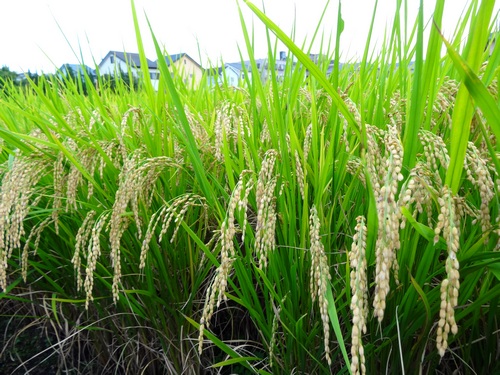 Jii-chan. Standing at the edge of one of our rice paddies, his short-handled sickle down by his side, his wide-brimmed straw hat shading his eyes, the early autumn sun turning the paddy to gold. Red dragonflies darting just above the ears of grain. the ears of grain, heavy, leaning into comfortable arcs, content. And me, looking up at his strong, rugged face.
Jii-chan. Standing at the edge of one of our rice paddies, his short-handled sickle down by his side, his wide-brimmed straw hat shading his eyes, the early autumn sun turning the paddy to gold. Red dragonflies darting just above the ears of grain. the ears of grain, heavy, leaning into comfortable arcs, content. And me, looking up at his strong, rugged face.
Under the warm autumn sun. Close to heaven.
Bucket lists
Mid-September. The roses are hanging on—blooming, maybe, for the last time this year.
But the spider lilies have come out, too. They’re standing tall here and there, at the edge of rice fields, or in little clumps near sidewalks, soaking up the sun, keeping an eye on things.
I think this is the first year I’ve really noticed white spider lilies. These I spotted on campus.
Roses and spider lilies. It’s a nice season. I like it.
It’s good to know what you like.
The other day I was reading an article providing us with a new bucket list. Bucket lists. You know, lists of all the things you really should do before you die. This particular bucket list, though, was a list of things you should do before you die that you shouldn’t do.
I’m not sure the purpose of these lists. It’s great for media to provide everyone with information about what’s out there in the world. What there is you can see. What there is you can do. I appreciate it. Greatly. But how can a journalist tell you if it is meaningful for you to swim with dolphins? How can a journalist tell you if it’s void of meaning for you to swim with dolphins?
So I’ll pass on the lists—the lists of must-dos and the list of must-dos that you must not do. But I like information. In fact, I’d like to read a good article about dolphins. Yeah, including where I might be able to swim with one. Or stuff about their habits, like how fast they can swim, or how long they can stay under water, or what they like to eat, or what all that rat-a-tat squeaking is all about, or whether they cry when someone they’re hanging out with gets injured seriously. That sort of stuff I can’t get enough of.
Anyway, the roses will be blooming in my tiny little garden for a few more days, and the shiny green kumquats are just beginning to go orange, too.
Yes, and all over town, those debonaire spider lilies have sprung up indeed. They’ll be around for a few more days, just checking things out.
A few hours of life in a minor key
Nothing will ever be perfect, not in any individual life. Yet each day we greet the morning star. Each day we are given a new chance to shine.
Ahead the clouds hung low, and the grey was thick. It was a true rain, not mist, but it was soft, didn’t splatter on the windshield. It seemed as if the drops were being dribbled out from hundreds of invisible eyedroppers, their tips fractions of inches above the glass. The windshield was already wet, so the drops spread out silently into big perfect circles.
I remembered a long time ago, during a high school summer, working with a team of brick masons. It was my job to push the wheelbarrow around the muddy lot, delivering the cement that the masons would trowel onto bricks and blocks. If it was too stiff they couldn’t work with it. If it was too soupy they couldn’t work with it. It had to be just right. And they’d get irritated if I splattered it onto their arms and clothes or into their faces. It took a while to get the hang of it, lowering the shovel right down to the edge of their “palettes,” tipping the shovel gently so that the cement—the “mud,” they called it—would spread out evenly, gently, without a mess, just like those soft raindrops on the windshield.
A bit of unpleasant business awaited. Maybe, I thought, not able to see the traffic light just a hundred meters or so up the road, the next couple of hours were going to play themselves out in a minor key. All felt somber.
But as I turned toward the park, I found myself thinking (as obvious as the fact was) that it wasn’t complete darkness. If it were, I wouldn’t even be able to see the soft drops spreading out on the windshield. For sure, light, which I seemed not to “see,” was seeping through—and as long as there was light, no matter how much or little, no matter how strong or weak, there was the opportunity to shine.
It was weird how tangible it was—how I could feel, submerged in the pea-soup grey, all the good things to come.
The next morning I was on Ryuso Mountain. Beneath the cedars, you could see the sun filtering in. All there was to do was to climb—and see what the light hit.
At the top, out in the open, everyone was hungry.
Sometimes
Thinking of Thoreau
The lotuses were still blooming when I rode my bicycle to Kita this past Saturday. On July 4th, 1854, Thoreau had a white water lily on his mind, not a lotus, but the two are not all that different.
(just kumquats in the garden)
A month after the court system in Massachusetts had returned Anthony Burns to bondage in Virginia, Thoreau spoke in Framingham, condemning the people and government of his home state for their lack of disdain for the Fugitive Slave Law–and for their accompanying lack of morality.
(just the sky from the Nihondaira “hill”)
Thoreau could not imagine a life led without a solid moral vision–and thought he’d been thrust into a dark, dark place. He was appalled that anyone could believe that a law could make slavery just. In his speech, he did not hold back.
(just the red flowers in the garden)
I dwelt before, perhaps, in the illusion that my life passed somewhere only between heaven and hell, but now I cannot persuade myself that I do not dwell wholly within hell. The site of that political organization called Massachusetts is to me morally covered with volcanic scoriae and cinders, such as Milton describes in the infernal regions. If there is any hell more unprincipled than our rulers, and we, the ruled, I feel curious to see it.
(just the ocean . . . from the Miho Pine Grove)
He knew, though, that an unjust law did not alter Nature–and that we, by virtue of our ability “to perceive and love” Nature, were not without hope of understanding that man’s deeds could “smell as sweet” as the lily.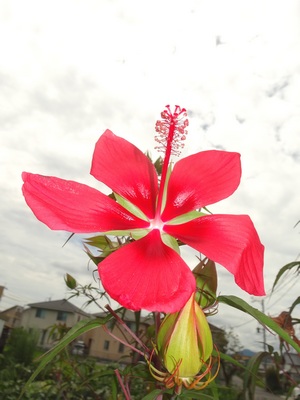
(just a red flower . . . in the neighborhood)
But it chanced the other day that I scented a white water-lily, and a season I had waited for had arrived. It is the emblem of purity. It bursts up so pure and fair to the eye, and so sweet to the scent, as if to show us what purity and sweetness reside in, and can be extracted from, the slime and muck of earth. I think I have plucked the first one that has opened for a mile. What confirmation of our hopes is in the fragrance of this flower! I shall not so soon despair of the world for it, notwithstanding slavery, and the cowardice and want of principle of Northern men. It suggests what kind of laws have prevailed longest and widest, and still prevail, and that the time may come when man’s deeds will smell as sweet. Such is the odor which the plant emits. If Nature can compound this fragrance still annually, I shall believe her still young and full of vigor, her integrity and genius unimpaired, and that there is virtue even in man, too, who is fitted to perceive and love it.
(just a neighbor in the beans . . . but not Thoreau’s bean field)
Yanbushi Mountain
Some folks stayed home, but all those who were out on the mountain had a great day. Some scrambled up the river, frenetic with energy. Others were content to plod along. No problem. Everyone has his or her own pace.
And some of those who lived on the mountain seemed pretty much satisfied to stay in the spot they called home. They seemed to understand what the mountain was all about right there were they were.
It seems that those who come for the day see something magical in all the loose rock . . . and that they can’t stop themselves from picking up a big rock or a little stone and stacking it on top of another big rock or stone. For sure, as you climb the path along the Nishi Hikage River, here and there you’ll see stacks of rocks and stones.
You can choose your own word for one of these stacks: church, temple, shrine, cute stack of rocks. I prefer temple, more or less because I like the sound of the word. Temple.
And you will add a rock to a rising temple. Because you’ll feel something very nice on the mountain—how could you not, what with the way that river keeps rushing, and the trees keep growing, and what with your eyes discovering things growing like you never knew things could grow, in all sorts of nooks and crannies, in shapes and sizes and colors that awaken you, that sometimes even make you feel like you’re scuba diving in the sky?—and you’ll want to express your gratitude to the mountain for giving you that feeling.
Of course you will.
You’ll understand that the others, the ones who built up the temple you’re adding to—ones you’ll never meet—felt something pretty much the same as you did and wanted to express the same gratitude, and that your expression of gratitude is going to add to theirs . . . and that the dear souls who come after, well, they’re going to want to express their gratitude all the more, because of what you added.
Last Saturday, before we got to the “temple zone,” I found a shard from a broken bowl. Yes, yes, life is perfect nowhere. There are broken bowls everywhere. But here you are closer to the temples that are being built. Here, it’s a bit easier to see that you can build a temple from a broken bowl.
Yesterday, our party climbed steadily but also stopped a lot to take pictures (and fiddle with the camera). Trailhead (8:30 am) –> Oo-iwa, “the big rock” (9:25 am) –> Yomogi Toge, the Yomogi Pass (10:15 am) –> Yanbushi summit (12:05 pm). You can find good trail-defining pictures with trail times for a November climb here.
The first half of the trail follows the river up—and takes you across the river numerous times. Keep that in mind if it’s rained a lot before you go.
You’ll see lots of big rocks along the way, but believe me, you’ll know when you get to the big rock. It’s big. And there’s a sign that says this is the big rock (大岩).
You continue along the river all the way to the pass. (Honesty compels me to tell you that a “small” landslide has made the last stretch to the pass a bit treacherous. There’s a rope you can hold on to, but it may be more than some want to try.)
But let’s assume you get to the pass. Then it’s just a lot of huffing and puffing up to the top of Yanbushi. If you want to rest, search out this “sitting tree.” (Sure, sure, which way would you grow?)
Just before you get to the top, the trail widens, and on both sides of you, there are fields of small bamboo. Yanagiran also grow in the open areas, but we were a couple of weeks too late, at least this year. We saw only a few blossoms. Willow herb or fireweed may be translations for yanagiran, literally “willow lily.”
On a clear day, you can see Fuji-san from the top of Yanbushi, but this day wasn’t clear.
But it was lovely just the same . . . and what did it matter, we’d help build a beautiful temple.
Good water
Someone saved my life today.
That’s what I feel like singing every time I climb Ryuso.
In my neighborhood, 33 degrees. Thirty minutes by car to the trailhead parking lot, 26 degrees. Fifty-seven minutes climbing, 17 degrees. (That’s 91.4, 78.8, 62.6, respectively, for my fahrenheit friends in the U.S.)
But when I say I want to sing someone saved my life today I’m not really talking about the temperature. On the mountain, my brain works. Some things, at least a few, make sense.
To put it mathematically, for me . . .
RYUSO = GOOD DRINKING WATER.
Ah, Ryuso, hope to see you again soon!
